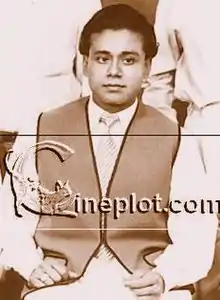Deebo Bhattacharya
Deebo Bhattacharya was a Pakistani-Bangladeshi musician who worked in Lollywood movies during the era of 1960s and 1970s. He is known for composing the classic song, "Bare bemurawat hein ye husn walay kahein dil laganay ki koshish na karna" for the film Badnaam (1966). After 1971, he became a citizen of Bangladesh.
Deebo Bhattacharya | |
|---|---|
 | |
| Background information | |
| Born | Bengal, British India |
| Origin | Karachi, Pakistan |
| Died | 1990s |
| Genres | Film score |
| Occupation(s) | Music director |
| Years active | 1956 – 1974 |
Early life and career
Deebo was born into a Bengali Hindu family. He arrived in Pakistan from India in 1956 to work as an assistant to Indian music director Timir Baran who was going to compose music for the film Anokhi. While Timir Baran moved back to India after composing for a few Pakistani films, Deebo remained in Pakistan and resided in Karachi.[1]
In 1957, his first film as a solo music director,Maska Polish, was released. The movie was a box office disappointment. The same fate befell his next two movies, Yeh Duniya (1960) and Lakhoun Fasane (1961). With the release of Banjaran (1962), he rose to notoriety, and the song "Na jane kaisa safar hai mera", sung by Noor Jehan, became a hit. The other milestone of Deebo's career was the film Badnaam (1966). One of its songs, "Bare Bemurawat Hain Yei Husn Waale, Kahin Dil Lagane Ko Koshish Na Karna", vocalized by Suraiya Multanikar, is considered one of his most timeless tunes. In 1968, he composed songs for producer Waheed Murad's film Sumandar including the theme song, "Tera Mera Sathi Hai Lehrata Sumandar".
In the 1960s and 1970s, he composed music for several other films, including; Shararat (1963), Beti (1964), Taqdeer (1966), Meray Bachay Meri Ankhen (1967), Bahadur (1967), Jhuk Gaya Aasman (1970), and Tiger Gang (1974).[1][2][3][4]
Popular compositions
| Song title | Singer(s) | Lyrics | Movie |
|---|---|---|---|
| Na jane kaisa safar hai mera | Noor Jehan | Fayyaz Hashmi | Banjaran (1962) |
| Ae dil tujhe ab un se ye kaisi shikayat hai | Masood Rana | Masroor Anwar | Shararat (1963) |
| Bare bemurawat hein ye husn wale | Suraiya Multanikar | Masroor Anwar | Badnaam (1966) |
| Hum bhi musafir tum bhi musafir | Masood Rana | Masroor Anwar | Badnaam (1966) |
| Hasein bahar ye mousam | Ahmed Rushdi / Runa Laila | Sehba Akhtar | Mere Bachay Meri Ankhein (1967) |
| Tera mera sathi hai lehrata samandar | Ahmed Rushdi / Masood Rana & co | Sehba Akhtar | Samundar (1968) |
| Yon rooth no gori mujh se | Ahmed Rushdi | Sehba Akhtar | Samundar (1968) |
| Tanha thi aur hamesha se tanha hai zindgi | Mehdi Hassan | Sehba Akhtar | Jaltay Armaan Bhujtay Deep (unreleased)[5] |
| Chaand Ki Saej Pe Taaron Se Saja Ke Sehra | Runa Laila[6] | Sehba Akhtar | Jhuk Gaya Aasman (1970) |
Later life and death
Deebo moved to Bangladesh after the separation of East Pakistan in 1971. He died in the early 1990s, according to reports, after living for nearly two decades there.[1][3]
References
- Parvez, Amjad (31 January 2019). "Deebo Bhattacharya — a captivating composer". Daily Times.
- "Deebo". Pak Film Magazine. Retrieved 3 April 2022.
- "دیبو بھٹاچاریہ اور مسعودرانا". Pak Film Magazine. Retrieved 3 April 2022.
- Zafar, Abdul Hafeez (17 August 2020). "بڑے بےمروت ہیں یہ حسن والے، دیبو بھٹا چاریہ کا سنگیت سب سے منفرد تھا". Roznama Duniya.
- "Unreleased films & songs". Pak Film Magazine. Retrieved 3 April 2022.
- Asif Noorani (18 June 2011). "Runa Laila on Mehdi Hassan". Cineplot Music website. Archived from the original on 1 November 2011. Retrieved 3 April 2022.